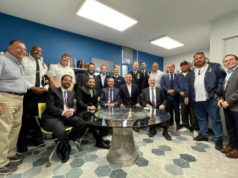 Convenitonal wisdom says, “If it ain’t broke, don’t fix it.” Assuming this is true, the fact still remains that even if it’s not broken, you’d better maintain it properly otherwise it will undoubtedly break. Our yeshivah system, the backbone of education in our community for nearly three generations, is in a crisis. The current economic woes are not the cause of the crisis, but may very well be the blow that could shatter the camel’s back if we don’t take it seriously and act now.
Convenitonal wisdom says, “If it ain’t broke, don’t fix it.” Assuming this is true, the fact still remains that even if it’s not broken, you’d better maintain it properly otherwise it will undoubtedly break. Our yeshivah system, the backbone of education in our community for nearly three generations, is in a crisis. The current economic woes are not the cause of the crisis, but may very well be the blow that could shatter the camel’s back if we don’t take it seriously and act now.
Reading this, you’re probably unlikely to be moved by the seemingly exaggerated use of the word ‘crisis’ to describe what many believe to be an age-old complaint; unfortunately, it is by no means an overstatement of the severity of the situation. In the current school year, with tuition assistance growing, nearly all of the mainstream yeshivahs, that cumulatively serve more than 6,000 children in our community, have suffered from a payroll emergency of one kind or another. To fully appreciate the depth of the problem, you need to first understand some popular myths about our day schools.
Myth #1: Bloated Budgets
According to the NYC Board of Education, the average expenditure per student in the city public school system was $19,100 in 2007.
The expenditure per student in our community yeshivahs is closer to $16,000 per student.
Since about 30% to 35% of the students receive some sort of tuition assistance, the average tuition for each full paying child should be $25,000 annually, but it’s not.
In fact, the schools must rely on outside fundraising and grants equal to approximately $5,000 to $6,000 per child each year, even at the current crippling tuition rates.
Finally, 70% to 80% of the annual budget goes directly to faculty and administrative salaries, which are modest, to say the least.
Myth #2: Parents Should Bear the Brunt of the Cost
Although tuition is a necessity, the average community family is simply incapable of sustaining the current rate of tuition.
A family with four children in school faces a tuition bill approaching $80,000 per year.
Earning $200,000 per year, one would be hard pressed to pay full tuition along with a mortgage, food and clothing.
The cost of education is the responsibility of the community as a whole, not merely of individual parents.
A yeshivah education prepares the next generation with the necessary tools that will be used to benefit the entire community, as lay leaders, professional leaders and successful business people.
The Big Myth: Public School Plus an Afternoon Learning Program Can Replace the Yeshivah
I’ve heard this enough times now to be truly concerned. It’s been argued that past generations did just fine with a public school education coupled with an afternoon Talmud Torah class. Allow me to point out just a few of the oversimplifications that this view is based on.
In Syria, the Jewish community was completely insular. There were few outside influences serving to distract the children. The parents were well-educated in custom and halakha so that the home provided a strong partnership and foundation for educating the children.
Indeed, since coming to America, there was a significant dilution of adherence to halakha as people integrated more and more into secular society without the support of a yeshivah education coupled with the distractions of modern society. Only in the last two generations has there been a resurgence of a grass roots commitment to a vital Jewish life; a direct result of a more widespread yeshivah population entering adulthood.
If not for the benefit of being a small community, with a tight social network, the Syrian community in America could have suffered the same fate as most Ashkenaz communities that lost all connection to their heritage. We are no longer small, and we are by no means insulated.
A yeshivah is not merely a school that ‘also’ teaches some Hebrew subjects. It’s an all-encompassing culture that provides our children with the knowledge and the tools to go out into the secular world without fear of compromising their Jewish identities.
A call to arms is long overdue! We have, thank G-d, a community that has achieved incredible success in so many ways, not the least of which is financial. But we’ve also become more sophisticated and have ventured into and conquered industries and financial markets well beyond the entrepreneurial successes of past generations. It’s time to apply that same higher level of sophistication to our communal life.
In the past two decades, the greater Jewish world has seen a proliferation of national and private foundations dedicated to raising the bar of education in yeshivahs. These well-focused and well-managed organizations are having a significant impact, because they’ve focused their resources and attention on the one area that has the most potential for impacting the future. These visionaries have placed quality yeshivahs at the very top of the philanthropic agenda. It’s time that we do the same.
We must call upon a coalition of communal and institutional leaders, that has the clout to harness the vast generosity and charitable resources that the Syrian community is known for and institutionalize support for our schools.
There are many worthwhile causes that tug at us, but there is none more deserving of the greatest portion of our resources than our own educational institutions. That support must go well beyond brick and mortar and focus on the day-to-day operating needs of our schools. Our goal should be to reduce parent tuition, pay our teachers competitive salaries and still provide the schools with the funds to enhance and improve the level of education.
It is broken; but we have the means to fix it. I hope we have the will.
________________
Paul Kopyt is COO of Barkai Yeshivah.



